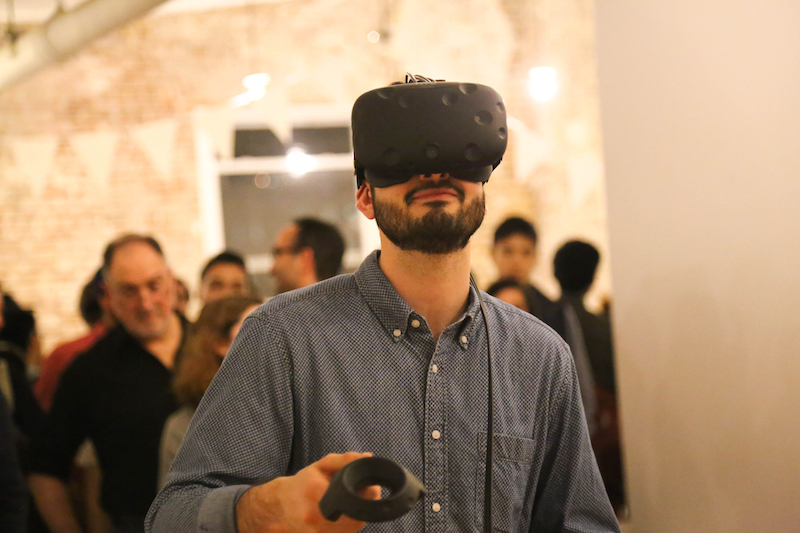
Though VR is still getting its legs, it is quickly becoming the new, revolutionary way we tell and experience stories.
Futurism NYC hosted an event of demos and lightning talks with top VR creators to discuss the future of storytelling in Virtual Reality. The event took place at the Knotel at 115 W. Houston Street on March 10th. Jordan Lejuwaan of Futurism says that the goal of the event is to “gather people that are enthusiastic about emerging technologies” -and not many emerging technologies create such hype and excitement like Virtual Reality. When people think of VR, they often think of video games but what these top VR creators want is to go beyond the world of video games and present a new platform for storytelling through VR.
Ari Kuschnir, founder of mssngpeces and the first presenter of the night said “Nobody knows the format for VR yet.” His company, mssngpeces, created the first-ever VR docu-series on the web. They’ve worked with Ted Launch of Ted Talks and the Clinton Global Initiative, creating “Inside Impact” a Virtual Reality film that features stories of positive social impact from around the globe. He said that the goal of his work with VR is to get the viewer from simply “watching” to “experiencing.”
Right now, a lot of Virtual Reality work is really just 360° video but Kuschnir says that its “the gateway drug to VR”. Rafael Maya, the Director of Product Development at Youvisit, which creates Virtual Reality campus-touring for universities such as Harvard said that for VR to really flourish, it has to be made more accessible, creating the habit for VR use “like that users have for Facebook or Instagram.”
Dean Beckwith and Tom Stlaurent jointly discussed Soylent, a crowd-powered interface that embeds workers from Mechanical Turk into Microsoft Word. What they envision is using the Amazon Mechanical Turk model to assign remote workers with the task of creating 3D models for Virtual Reality use with the initiative of creating a portfolio.
Sebastian Marino, President and CEO of Uncorporeal Systems Inc. said that their vision of VR is “to produce super-realistic CGE experiences” creating “true VR” using 10 DVR™ Cinema. You may already be familiar with Uncorporeal’s work; they won an academy award for their special effects work on James Cameron’s Avatar.
Caitlin Burns of Datavized, a company that offers turnkey services for groups that want to make VR, AR or 360° experiences, said that the true value of VR is that it “puts control back in the storyteller’s hands.”
Tarik Mohamed of Captivision 360°, showcased their award-winning VR project: Cardboard City. Mohamed said that what VR has to offer the storytelling experience is that it puts users “there, in the moment.”
The final presenters were Peter Zuspan and Peter Finkelstein from Kokawa, a cloud-platform with the goal of doing for VR “what Adobe did for graphic design.” They showed some of what they’ve done using Kokawa to the ooh’s and aah’s of attendants.
After the presenters gave their talks, attendants were allowed to try on a VR headset and experience some of the presenter’s work themselves.
The one unifying message amongst all the presenters was that the key virtue of VR in storytelling is that it enhances empathy; which can not only just revolutionize the way we experience and tell stories of fiction but impact how we respond to the non-fiction stories that occur the world over on a daily basis.


